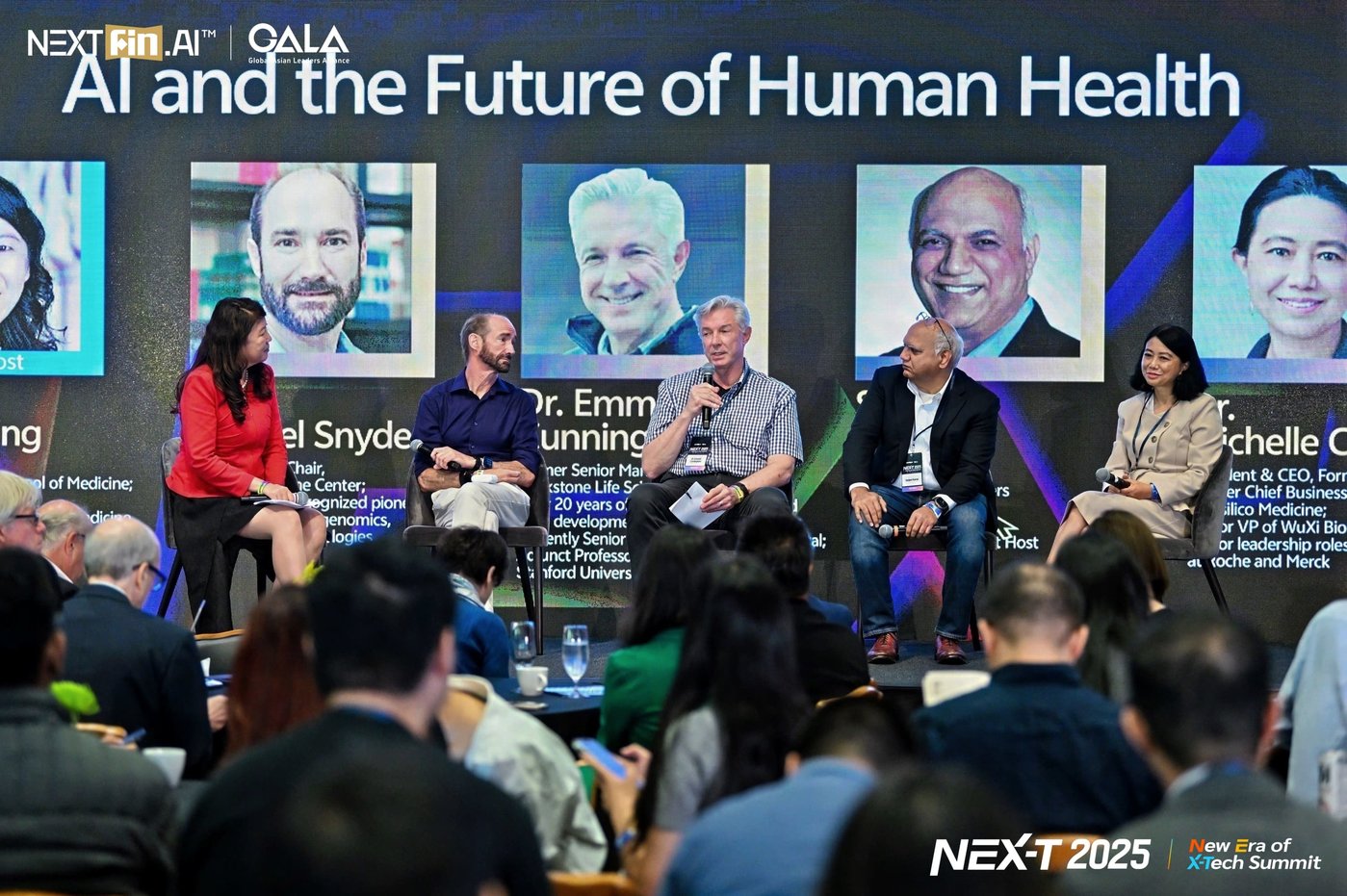
On-site photo
AI is likely to replace tasks rather than the whole profession of doctors, as the most analytic physicians may see their diagnostic roles augmented or replaced, but the human touch in patient care will become even more valuable, said Emmett Cunningham, senior advisor of HealthQuest Capital, last Saturday.
Cunningham, also an adjunct Professor at Stanford University School of Medicineand former senior managing director of Blackstone Life Sciences, made the remarks at a panel during the NEX-T Summit 2025 in Silicon Valley. At the panel "AI and the Future of Human Health", he joined discussions with Michael Snyder, Professor and Chair of Stanford Genome Center; Sanjeev Kumar, Stanford Distinguished Careers Institute Fellow; and Dr. Michelle Chen, President & CEO Form Bio Inc..
The session, moderated by Huijun Ring, an adjunct professor of Stanford University School of Medicine, focused on the role of AI in healthcare.
The panel addressed common misconceptions and areas of underappreciated opportunity in AI healthcare. Snyder cautioned that while AI's potential is vast, medicine's regulatory complexity slows adoption.
"Physicians spend so much time reading images even today. In some areas that's less, though, but it's pretty clear in many cases, these AI programs can actually make much better diagnostics than physicians. So I think we do need to work hand in hand now," he explained. "Maybe what's overhyped is that AI will totally replace physicians, and that may be true down the road, but it's probably not true in the immediate future because you do need a physician taking responsibility." .
Chen, also the senior VP of WuXi Biologics, emphasized that while AI applications like synthetic data generation and digital twins are often overhyped, areas such as predictive toxicology are underexplored. "If you can find the model (that) can highly predictable, that can really give us confidence before moving drugs from animals to human," she noted.
Snyder, highly recognized for his pioneering work in precision health, genomics and wearable technologies, emphasized AI's transformative role across four domains of medicine: medical research, diagnostics, therapeutics, and patient management. "Apparently I am on the research side mostly, although we do spin off companies. We can now get at the genetic basis of disease using AI and find ten to 100 times more genes to explain a lot more of the heritability. We can build early detection systems on the research side for telling you when you get disease before symptoms appear," he explained. He also highlighted AI's role in early disease detection, noting its ability to identify pathological changes before there is any symptom.
In diagnostics, AI applications in radiology and imaging are already assisting physicians by detecting abnormalities that may go unnoticed by the human eye. Some of these systems are semi-widely used and should become more broadly adopted, Snyder said. In therapeutics, AI can recommend personalized treatment plans, while in patient management, it supports continuous monitoring and predictive insights.
Cunningham highlighted the potential for AI to enhance efficiency across the healthcare system. "The first step will be efficiency mostly, and say practices, and whether it's drug discovery or seeing patients diagnosing patients, and then the next step, I think, will be able (to do) things that we cannot do," he said, citing ophthalmology as an example where AI can predict which patients will respond to specific treatments.
Chen, the former Chief Business Officer of Insilico Medicine, shared concrete case studies from AI-driven drug discovery. Generative AI has allowed companies to reduce preclinical drug development timelines from four to five years down to 18 months. In gene therapy, AI algorithms have increased viral vector expression twentyfold while reducing empty capsids, accelerating potential treatments for neurodegenerative diseases. She also stressed the importance of integrating AI with high-quality, labeled datasets, highlighting Tempus AI as a successful example of combining AI and clinical data.
Kawar, also the venture partner at Fusion Fund, noted that AI impacts multiple stakeholders in healthcare, including providers, patients, insurers, and pharmaceutical companies. "AI improves procedural efficiency and enhances the clinical value, ultimately impacting lives in meaningful ways," he said.
The discussion also addressed the shifting roles of the academia and the industry. Snyder emphasized that universities are best suited for discovery and proof-of-principle studies, whereas startups and industry partners are responsible for scaling applications. Academia also plays a critical role in ensuring fairness, ethical oversight, and equitable distribution of AI-driven healthcare technologies.
From the investors' perspective, Cunningham and Kawar emphasized that startup success hinges on addressing meaningful problems with unique datasets and AI models. 「If it can do something we can't do, then the next question is who will pay for that?" Kawar asked.
Chen pointed out China's leadership in AI adoption and innovation, noting that the country has become a major source of global pharmaceutical licensing deals. Clinical trials in China are often faster and cheaper, providing opportunities for accelerated development, she said, citing thriving biotech hubs such as Zhangjiang in Shanghai.
Kawar discussed India's approach, where a national digital ID infrastructure facilitates AI-enabled healthcare solutions, particularly in rural regions. AI-powered medical instruments, such as stethoscopes capable of autonomous diagnosis, extend access to underserved populations. Predictive models integrating genetic and environmental data can also forecast the emergence and spread of pandemics, demonstrating AI's potential in public health surveillance, he said.
Panelists envisioned a future where AI shifts healthcare from reactive "sick care" to proactive health maintenance. Snyder suggested a "moonshot" vision encompassing environmental health, mental health, and preventive care. Cunningham and Kawar emphasized integrating multi-omics data with AI to achieve deterministic, individualized medicine.
Chen outlined her vision for overcoming current barriers in data access. Breaking down data silos in healthcare will allow AI to democratize the system, making predictive, personalized care universally accessible, she said.
Questions from the audience focused on opportunities in women's health, fertility, and integrative medicine. Panelists pointed to AI-enabled monitoring of menstrual cycles, mood management, preeclampsia diagnostics, and personalized herbal medicine formulations as areas of promise.
Ring summarized the discussion by emphasizing that AI represents a pivotal tool in bridging the gap between medical knowledge, technology, and real-world health outcomes. As AI continues to evolve, its integration into healthcare promises to transform how humans live, age, and maintain their well-being, she said.




























